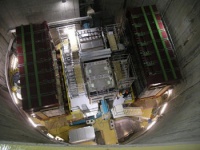T2K - an international experiment led by Japan and part funded by the UK’s Science and Technology Facilities Council (STFC) - is to probe the strange properties of the neutrino by firing the most intense neutrino beam ever designed from the east coast of Japan, all the way under the country, to a detector near Japan’s west coast.
Prof Dave Wark of Imperial College London and the STFC Rutherford Appleton Laboratory, the international co-spokesperson of T2K, said: ‘It was extremely satisfying to see the first events in the detector. It has been the result of a lot of hard work by a large number of people and I think we will have a sake or two to celebrate and then send a bottle along to CERN as I hear they are going to need quite a few bottles pretty soon as well.’
Among the international team of around 400 physicists from 12 countries, UK scientists have made a significant contribution to the experiment. With nine UK institutions involved, the UK has produced vital hardware for both the accelerator and detectors. The UK is also playing a leading role in the analysis software for the experiment and will be fully involved in using the data to explore the properties of neutrinos.
This is expected to begin in January 2010, when the experiment is scheduled to begin running in earnest.

Prof Keith Mason, chief executive officer of the Science and Technology Facility Council (STFC), said: ‘We’re very excited to be a part of the T2K project. Neutrinos are incredibly difficult to detect but with the skilful engineering that has gone into this experiment we will soon be able to learn much, more about these elusive particles, further understand their role in the formation on the universe and improve our model of particle physics.’





Poll: Should the UK’s railways be renationalised?
If only the track is nationalised then it is an emasculated one with limited function and improvements will be focused on existing commuter and large...